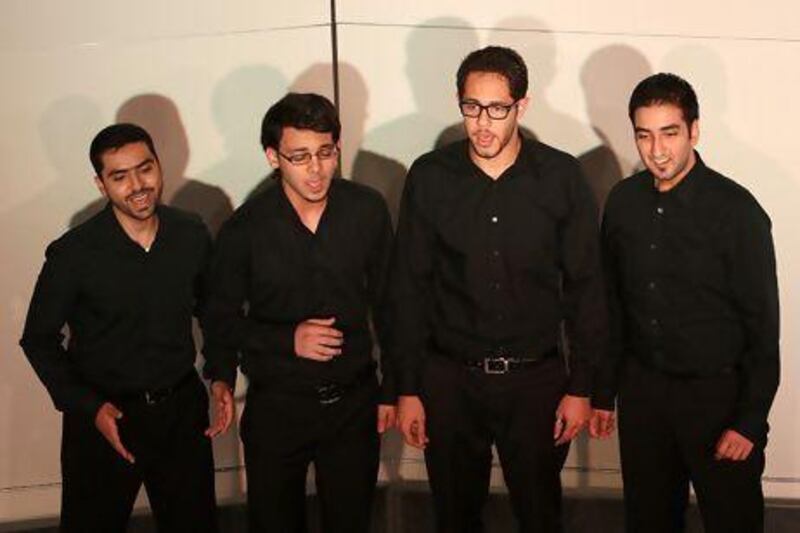Twenty-five year-old Emirati Alawi Alsafi is an electrical engineer by day and a barbershop singer by night.
"The greatest honour for me would be to one day perform the national anthem for the rulers of the UAE," he says.
Almost four years ago, Alsafi joined forces with three fellow undergraduates from the American University of Sharjah erforming arts programme to form SAMA - the world's only all-male, Arabic, Emirati a cappella quartet.
"We first discovered the traditional singing style through our US music teacher," he says. "We liked it so much that we took it up as a hobby and decided to learn about it properly."
Assuming the parts of tenor, bass, lead and baritone, the group began practising once a week to perfect the harmonies epitomised by the singers in the 1940s barbershop revival era.
While the musical arrangements were authentic, the songs didn't necessarily conform to the period.
"Some of our most popular songs are from Walt Disney films," says Alsafi. "Go the Distance from Hercules or A Whole New World from Aladdin, for example. We like them because they can be sung in different languages and the meaning translates very well. They have powerful messages and the lyrics are full of tales of friendship, realising your ambitions, keeping motivated, staying focused and so on."
One Disney arrangement, however, didn't best lend itself to a live performance on the popular MBC programme Arabs' Got Talent last year.
"We auditioned for the judges in Lebanon and sang I Will Go Sailing No More from Toy Story, as we loved the harmonic arrangement," says Alsafi. "The panel, though, remarked it was too sad - almost like a funeral song. We weren't judged on our musical ability but on their personal tastes. They said they were looking for something more entertaining, swinging and energetic. Something more popular such as pop, R&B, dance or house music."
Alsafi concedes the quartet's performance on the night wasn't entirely pitch-perfect but is quick to add that judicious editing meant that only the worst 30 seconds of their appearance was broadcast.
Although SAMA didn't make it through to the next round, they were anything but discouraged. They continue to practise and have commissioned Arabic musical formations to heighten popularity of the barbershop-style in the region.
"At our next public performance, we plan to sing [an arrangement of a famous Arabic folk song] Lamooni Ely Gharo Meni by our professor, Dr John Perkins," he says.
"Another classical arrangement is by Shireen Abu Kader from Jordan and called Lamma Bada Yatathanna - which is meant for a choir but we're able to perform it as a four-part formation.
"There's a very limited amount of quartet songs on the market and we're looking forward to singing these pieces as I often have to source sheet music from a trading network called www.pianofiles.com."
With the TV talent show judges not jumping on the barbershop bandwagon, however, SAMA are keenly aware that the Emirati public might be an equally tough crowd to please.
"Some of our friends and family have really loved our singing but a few have reservations and think it's too relaxing," says Alsafi. "But we remain optimistic and take on the positive feedback that keeps us driving forward."
Though the group have no immediate plans to give up their day jobs, they would relish the chance to record an album and reach an audience beyond the UAE's borders.
"Our music is still quite unfamiliar in the Arab world and it's a big responsibility for us to share it and help people grasp the beauty of it," says Alsafi. "I feel sure barbershop quartet singing will become popular here. We just need to educate more people. We would be so incredibly proud to be the first Emirati group to make it."
When it comes to singing, four is the magic number
The barbershop quartet genre melds both the pop and a cappella music worlds. Each member of the four-piece group has a distinct role. One is the lead while others take up the tenor, bass and the baritone positions. With its origins stemming back to the 1850s, the name comes from vocal groups performing in barber shops, a venue that at the time was as much a community centre as a business. The first groups were made up of churchgoing African-Americans, who reportedly used to sing spirituals and hymns while waiting for their haircuts. White singers also began forming their own groups and barbershop music reached its peak of popularity between 1900 and 1919 - when groups would wear colourful matching suits - before suffering a decline. The genre was revived in the 1940s and has lingered in popular culture ever since, influencing many pop groups from The Beach Boys to Boyz II Men. The music has also been popularised by television shows, memorably in a classic episode of The Simpsons, Homer's Barbershop Quartet, where Homer Simpson recalled his time as member of The B-Sharps. The episode also featured the music legends George Harrison and David Crosby. Other shows that have featured barbershop quartets include Friends, Scrubs and King of the Hill.
This article has been altered to reflect that Alsafi joined forces with three fellow undergraduates from the American University of Sharjah's performing arts programme to form SAMA.










